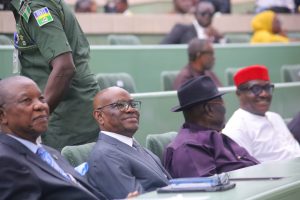The Minister of the Federal Capital Territory (FCT), Barrister Ezenwo Nyesom Wike, has called on African leaders to reduce dependence on foreign aid and prioritise home-grown innovation as a pathway to the continent’s sustainable development and global competitiveness.
Speaking at the 2025 Innovate Africa Conference held at the ECOWAS Conference Hall in Abuja, with the theme Reimagining Africa’s Leadership and Investment, Wike emphasized that Africa’s destiny should be designed and driven by Africans themselves.
“Africa’s future must not be shaped in the boardrooms of donor agencies, but in the farms, workshops, and classrooms of creative Africans determined to transform their continent,” he declared.
Wike urged African governments and policymakers to move away from what he described as “poisonous philanthropy”—foreign aid that often comes with conditions—and instead focus on developing indigenous solutions that strengthen their economies.
“Development cannot be donated; it must be built,” he said. “No nation or continent has ever achieved greatness through the generosity of others. Africa must define its progress by innovation, self-reliance, and bold ideas.”
He highlighted that 70 percent of Africa’s population is under the age of 30, describing this youthful demographic as a “revolution waiting to happen.” With a population of over 1.4 billion and a combined GDP exceeding $3 trillion, the Minister stressed that Africa can no longer be seen as a marginal player in the global economy.
According to him, Africa’s true wealth lies in its people—their creativity, resilience, and entrepreneurial spirit. He called for strategic investment in human capital, infrastructure, and innovation-driven sectors to fully harness this potential.
“Our focus must shift from raw material exports to value creation. The youth of Africa represent not a burden but the foundation of our future,” Wike stated.
Wike praised the African Continental Free Trade Area (AfCFTA) as a major step toward achieving economic self-reliance, describing it as a practical expression of the Pan-African dream.
He stated that by deepening regional integration and removing trade barriers, Africa could transition from dependency to dignity, emphasising that the continent must position itself as a producer rather than a perpetual consumer of global goods.
“AfCFTA is more than an economic policy—it is Africa’s declaration that we will replace aid with trade and dependency with productivity,” he said.
The FCT Minister identified poor and short-sighted leadership as one of Africa’s greatest challenges, noting that many nations on the continent have been held back by leaders who prioritize personal gain over collective progress.
He urged African leaders to embrace transformational leadership built on vision, courage, service, and accountability.
“The Africa we desire cannot be built by transactional leadership focused on self-interest. We need bold, visionary leaders ready to take tough decisions for the common good,” Wike said.
Wike also commended President Bola Ahmed Tinubu, GCFR, for exemplifying transformational leadership through decisive policy reforms, especially the removal of the fuel subsidy, a step he described as long overdue but necessary.
“While previous administrations acknowledged the dangers of subsidy, none dared to act. President Tinubu did—and the results are already visible in increased revenue for states and local governments,” he said.

He added that the ongoing infrastructural renewal projects in the FCT, including new road networks and the revitalization of public spaces, reflect what is possible when leadership meets determination.
During the event, Barrister Wike was honoured with the Innovate Africa Leadership Award 2025 for his contributions to leadership and innovation in governance. He dedicated the award to President Tinubu and the resilient people of Nigeria, pledging to continue championing development policies that empower citizens.
He also called for greater synergy between leaders and citizens, stressing that Africa’s transformation requires the active participation of both the government and the governed.
In his opening remarks, Mazi Sam Ohuabunwa, Chairman of the conference and CEO of Neimeth International Pharmaceuticals, said the goal of the summit was to mobilize Africans globally to harness the continent’s abundant resources and talents.
“Africa has performed far below its potential for decades. This conference aims to refocus leadership and innovation as tools to unlock our collective potential and reposition Africa for global competitiveness,” Ohuabunwa noted.



